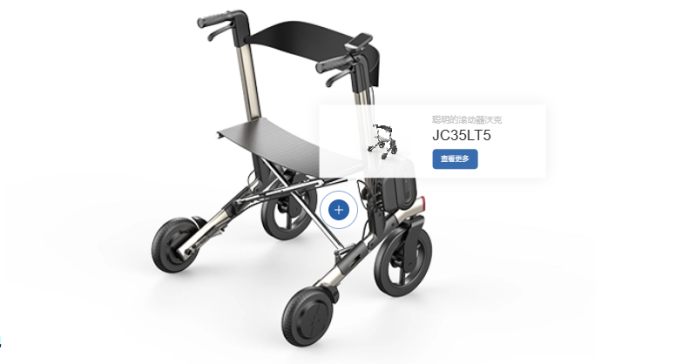If you or a loved one is experiencing mobility challenges, a rollator walker might be the solution you’ve been looking for. These mobility aids are designed to enhance walking stability, providing both support and comfort. But with so many options on the market, how do you choose the best rollator walker for your needs? This guide will help you understand what a rollator walker is, its benefits, and how to select the perfect one.
What Is a Rollator Walker?
A rollator walker is a type of mobility aid designed to help individuals maintain their independence while walking. Unlike traditional walkers that require the user to lift and move them forward, rollators come equipped with wheels on all four legs, allowing the user to roll the walker forward with minimal effort. Most rollators also have a built-in seat, which provides a place to rest when needed.
Rollator walkers typically come in three- or four-wheel designs, with the four-wheel version being the most common. They are often adjustable to accommodate different heights, ensuring a comfortable and ergonomic experience for the user.
How to Choose the Right Rollator Walker
When shopping for a rollator walker, several factors should be considered to ensure you select the right model for your needs. Here are some important aspects to look out for:
1. Wheel Size and Type
Rollator walkers come with different wheel sizes, typically ranging from 6 to 10 inches. Larger wheels are ideal for outdoor use, as they can handle rough terrain such as gravel or uneven sidewalks. Smaller wheels are best for indoor use, providing better maneuverability in tight spaces.
2. Weight Capacity
Ensure the rollator walker you choose can support your weight comfortably. Most rollators have a weight capacity ranging from 250 to 500 pounds, but it’s always best to double-check the specifications.
3. Adjustable Features
Look for a rollator with adjustable handles to accommodate your height and ensure a proper posture while walking. A model with adjustable seat height is also beneficial for added comfort.
4. Brakes and Safety Features
Ensure the rollator has reliable handbrakes that are easy to use. Some models offer a locking feature that can secure the walker when sitting, providing stability.
5. Storage and Accessories
Consider whether you need extra storage options like a basket, pouch, or cup holder. If you plan on using the rollator for errands, these added features will make it more practical.
6. Foldability
A foldable design makes it easy to store and transport the rollator. Most models feature a simple folding mechanism that allows you to collapse the walker with ease.
Popular Types of Rollator Walkers
1.Standard Rollator Walker
This is the traditional model with four wheels and a seat. It’s ideal for users who need support while walking but can still manage short distances on their own.
2.Junior Rollator Walker
Smaller in size, these models are designed for individuals with shorter stature or those who need a more compact walker.
3.Heavy-Duty Rollator Walker
Built for larger individuals or those with greater mobility challenges, these rollators feature reinforced frames and higher weight capacities.
4.Three-Wheeled Rollator Walker
A more lightweight option, these walkers are best for indoor use or in areas with less demanding terrain. They offer greater maneuverability but may lack the stability of a four-wheeled design.
Summary
A rollator walker can significantly improve your mobility, independence, and safety, providing much-needed support whether you’re at home or on the go.
When choosing the right model, consider factors such as wheel size, weight capacity, adjustable features, and added storage options to find the best fit. With so many options, a walker can fit a variety of needs and lifestyles, improving your overall quality of life.
For more information about rollator walker, please visit our company website at https://www.jiecang.com/
FAQ:
1.Which is better, steel or aluminum rollator?
Steel is stronger, but aluminum is lighter. If you weigh more than 250 pounds, you will likely want a steel walker. Otherwise, you can go with one of the lighter (and more easily pushed) aluminum rollators.
2.Why is it hard to keep balance when walking?
Loss of balance or unsteadiness.Losing your balance while walking, or feeling imbalanced, can result from: Vestibular problems. Abnormalities in your inner ear can cause a sensation of a floating or heavy head and unsteadiness in the dark. Nerve damage to your legs (peripheral neuropathy).
3.Can I get a prescription for a rollator walker?
Medicare can cover the cost of a rollator walker if your healthcare professional determines that it’s necessary for your health. A doctor who accepts Medicare has to prescribe the walker, which you need to get from a Medicare-approved supplier.
4.Is an upright walker better than a rollator?
Maneuverability: Rollators are typically more maneuverable than upright walkers, as their frames are smaller and more compact. Stability: Upright walkers generally have a wider base of support and are more stable than rollators, which can be an advantage for those who require extra stability and balance support.








